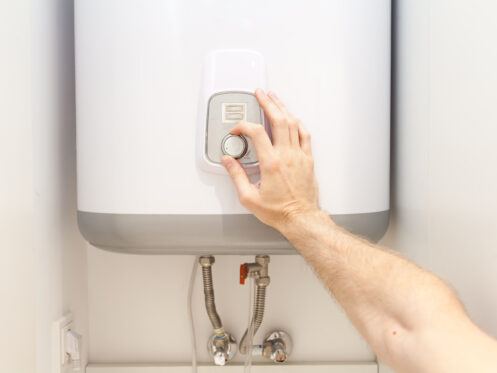Buying a water heater requires more thought and consideration than impulsively picking out the first one you see. Numerous variables impact the performance, efficiency, and total worth of a water heater, which in turn affects its price. In order to make a well-informed selection that fits your budget and fulfills your household’s hot water demands, it is essential to understand these variables. This detailed guide will help you choose the best water heater for your house by examining ten essential criteria that affect the overall cost.
1. Water Heater Fuel Type
Choosing the right fuel type significantly impacts how much a water heater will cost. Generally, electric water heaters are more cost-effective because of their reduced upfront cost. Contrarily, water heaters that run on gas or propane tend to cost more initially. But think about the operating expenses in the long run; water heaters that run on gas or propane may be more energy efficient and save you money on electricity bills. To choose a heating solution that is both affordable and efficient, you should consider your budget and energy efficiency objectives while selecting the fuel type.
2. Tank vs. Tankless Water Heater
Tank and tankless water heaters are quite different in terms of price. Because of their superior technology and ability to heat water on demand, tankless water heaters typically incur a higher initial cost. Even though tankless types save energy by heating water only when required, the higher upfront cost puts them out of reach for some buyers. Water heaters with a conventional tank design, on the other hand, are usually more affordable. Optimizing the investment requires considering long-term efficiency objectives, hot water consumption, and budget limits.
3. Capacity of Water
The number of gallons a water heater can hold directly correlates to its price. More powerful models that heat more water cost more upfront than smaller water heaters. A higher price tag indicates the unit can handle the additional demand for hot water that comes with bigger homes or situations with higher demand. To avoid overspending on hot water, it’s crucial to find a happy medium between your household’s needs and the capacity of your water heater.
4. Water Heater Energy Efficiency
Energy efficiency is another important factor when calculating how much a water heater would cost. Although more expensive up front, models with better energy efficiency ratings typically result in long-term savings on power costs. You save over time because water heaters with high energy factor or uniform energy factor ratings are more efficient at converting energy into hot water. If you want to find a solution that fits your budget and helps reduce operating expenditures during the water heater’s lifetime, energy efficiency should be your number one priority.
5. Installation Complexity of Water Heater
A water heater’s price is also proportional to the difficulty of installation. Due to tankless water heaters’ technical complexity and unique installation requirements, their installation prices tend to be higher than those of conventional tank-style systems. Alternatively, traditional tank water heaters typically have less complicated installation procedures, making them more affordable. No matter the type you choose, the need for expert knowledge and tools increases the overall installation cost. Before buying a water heater, be sure it fits your demands and budget by thinking about how complicated the installation will be.
6. Brand of Water Heater Matters
It’s important to weigh the reputation and performance history of the brand you choose with cost considerations for a satisfied investment. A water heater’s brand reputation significantly influences its price. Well-established and reputable brands generally command higher prices due to their proven track record, quality materials, and advanced technologies. Even though these brands may come with a higher upfront cost, they usually provide reliability, durability, and better customer support. Budget-conscious consumers may explore less-known brands with competitive offerings. Still, it’s crucial to balance cost considerations with the reputation and performance history of the chosen brand for a satisfactory investment.
7. Warranty Importance
Manufacturers offer extended warranties to showcase their confidence in their products’ capacity to last and operate. A more extended warranty may add to the cost of the device upfront, but it will save you money in the long run by covering any repairs or replacements that may be necessary. To make the best decision for your budget and long-term needs, it’s essential to consider your warranty options carefully.
8. Water Recovery Rate
Water heaters with higher recovery rates indicate faster heating capabilities, which can lead to a higher price tag. Even though these units cost more, they can quickly heat water, meaning they can always meet your hot water demands. The capability to heat the tank quickly is especially beneficial for homes with ample hot water demands. A reasonable recovery rate for a water heater typically ranges from 30 to 50 gallons per hour (GPH). This rate indicates the amount of water a heater can heat within an hour. Choosing a recovery rate within this range ensures most households have an adequate and efficient hot water supply.
9. Maintenance Requirements
The amount you’ll have to pay to maintain a water heater over time is something to consider. Due to the reduced frequency and complexity of services required by simpler models, they may have lower long-term expenditures. However, there may be extra costs for machines needing specialists or regular maintenance.
10. Water Quality
Your home’s water quality also impacts the cost of a water heater. This is because hard water, which is highly mineralized and found in some areas, quickens corrosion in the heater as a result of mineral accumulation. Mineral accumulation shortens the unit’s lifespan. Some water heaters, including those with corrosion-resistant parts, are more expensive upfront because they are specifically engineered to withstand difficult water conditions. You need to think about the water quality in your area if you want to get a water heater that will last and not break down unexpectedly.
Why Professional Installation Matters
A do-it-yourself installation may seem like an excellent way to save money at first, but it usually ends up causing more problems than it’s worth. Only trained professionals can properly size the unit, hook it up to the existing water, gas, or electrical lines, and confirm that it complies with all applicable building regulations. Their expertise reduces the likelihood of system malfunctions and security threats, such as inadequate ventilation and leaks. If you want your water heater to last as long as possible and work as efficiently as possible, hiring a competent installation service is a good idea.
Bobby L Greene Plumbing, Heating & Cooling Co. installs water heaters in Shreveport, LA. We also help homeowners improve the comfort and efficiency of their homes with drain cleaning, hydro jetting, and sewer lining, among many other services. Our heating and cooling services keep your home comfortable all year long. Give us a call today to learn more about selecting the right water heater for your home.

